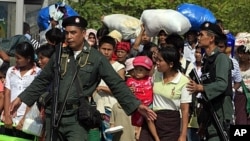The United Nations High Commission for Refugees and human rights groups have raised concerns about reports that Thailand is planning to repatriate more than 100,000 Burmese refugees living in camps in Thailand. Rights groups say conflict and human rights abuses are still going on in Burma, in a region littered by land mines from decades of fighting.
The UNHCR has greeted with caution reports Thailand plans to repatriate Burmese refugees living in camps along its western borderwith Burma.
Rumors of plans to repatriate the refugees follow a meeting between Thai Prime Minister Abhisit Vejjajiva and his national security chief. The issue was also raised during informal talks between Thai Foreign Kasit Piromya and Burmese counterpart Wunna Muang Lwin.
But Kitty McKinsey, a senior regional spokesperson for the UNHCR, says eventual repatriation of Burmese refugees should happen only when conditions of safety are met.
"This is a very long term process and I note that even the Thai government official did not put any date, any time line, any deadline," said McKinsey. "So closing refugee camps is an aim that we share. We’ve never said that these people should live in Thailand forever and ever. Nobody wants to be a refugee for their whole life."
McKinsey says the return of refugees should involve international monitoring and ensure that land mines are cleared and those returning do so voluntarily.
There are around 140,000 Burmese refugees, mostly ethnic Karen, in nine camps. They fled internal conflict after decades of fighting with the central government. Some people have lived in the camps for 20 years.
Thai government officials have held talks with Burma’s new government on closing the camps.
But rights groups say conditions inside Burma remain unsafe.
Jack Dunford, executive director of the Thailand Burma Border Consortium, an aid organization which provides for refugees’ care, says fighting is on-going inside Burma and those returning face possible rights abuses.
"We all hope that the refugees can go home in the future," said Dunfold. "We all want to see the camps closed. But the evidence suggests that actually the situation in eastern Burma has not improved; that conflict and human rights abuses continue creating more refugees at the present time rather than the situation where the refugees can go home."
Debbie Stothardt, spokeswoman for human rights group the Alternative ASEAN Network, says the Association of South East Asian Nations - of which Burma is a member - has obligations under international law to avoid possible abuses of human rights.
"The reality is that these people are being pushed back into situations where they will be subjected to more war crimes and crimes against humanity," she said."And, the international community, Especially ASEAN countries, need to understand their international obligations under international law. They are using the elections in Burma as an excuse to push back people into harm’s way is simply unjustified."
Rights groups say the Thai government is also coming under pressure from some international donors, who say Burma’s newly elected government marks a change in the political conditions inside Burma. But the rights groups say, despite Burma’s elected parliament, the country’s military remains the dominant power and is directing policy from behind the scenes.
Rights Groups Caution About Repatriation of Burmese Refugees
- By Ron Corben










